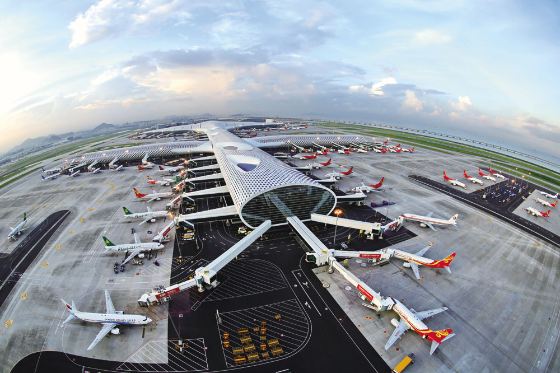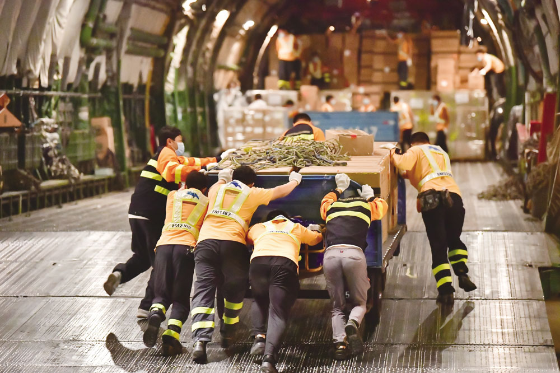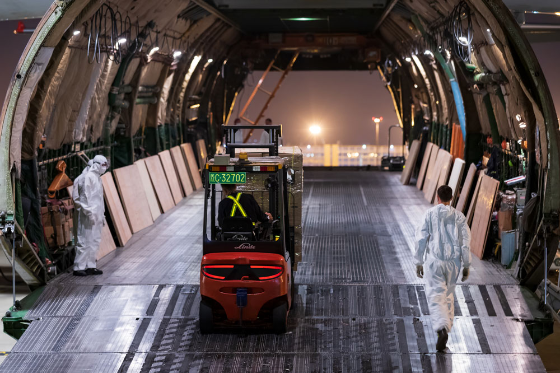By continuing to browser our site and use the services you agree to our use of cookies, Privacy Policy and Terms of Use. You can change your cookie settings through your browser.

A bird's-eye view of Shenzhen Bao'an International Airport, Guangdong province. CHINA DAILY
Shenzhen airport sees robust cargo growth
The airfreight industry on the Chinese mainland has experienced remarkable growth, with passenger travel still in the doldrums during the pandemic.
This expansion has been driven by strong global demand for medical supplies to combat COVID-19 and the exponential growth of e-commerce, with more people working, shopping and seeking entertainment online.
The mainland has also been one of the first areas worldwide to make a strong rebound from the pandemic.
The air cargo sector appears poised for another boost this year from the massive distribution of COVID-19 vaccines around the world.
Last year, Shenzhen Bao'an International Airport in Guangdong province was ahead of its rivals, with its freight volume growing 9 percent-the fastest rate among the country's top five air cargo airports. The facility is also expected to outperform most of the world's top 10 air cargo hubs, which recorded slowing growth in the first half of last year.
Meanwhile, cargo throughput at Hong Kong International Airport was down 6.99 percent last year compared with 2019.
The robust growth at Shenzhen airport looks set to help it retain its newly found edge in handling freight during the post-pandemic recovery period. The airport has opened eight new international routes for cargo-the biggest addition to its list of such destinations for seven years.
With its total annual cargo volume reaching 1.4 million metric tons, the airport ranked third in China last year, and featured among the world's top 30 in 2019.
It has been quick to seize opportunities after the initial shocks of the pandemic buffeted the aviation industry.
Zhang Jinlin, a manager at the airport's international cargo center, said he was surprised by the dramatic change in the business outlook last year.

Staff members at Shenzhen airport load anti-pandemic medical supplies onto an aircraft in March last year. CHINA DAILY
In February and March last year, operations at the airport hit rock bottom because of the pandemic, forcing Zhang to work mostly from home.
However, he said the turnaround came in April, when the airport apron was packed with aircraft from different countries. Zhang said he had never seen some of the planes, including an Antonov AN-124, the world's second-largest cargo aircraft, in the 16 years he had worked at the facility. Some of the aircraft had been previously requisitioned for military use.
One company even sent a fleet of six planes to the airport on a single mission.
Face masks, testing kits and ventilators were flown from the airport to other parts of the world to help people in need at a time when the pandemic was being brought under control in China but was raging elsewhere.
At China's busiest airports, including Shenzhen's, there was acute demand for exports of medical supplies to fight the pandemic.
Zhang's team worked night and day to handle the huge amount of work. He lives near the airport, and sometimes had to be called back to work in the middle of the night. Some of his colleagues who live farther away voluntarily slept at the airport to save time.

Medical supplies are loaded onto a plane at the airport in April. WANG RENDONG/FOR CHINA DAILY
Air cargo demand remained strong last year, but the supplies being shipped changed as the world entered a new phase in the battle against the virus.
Initial demand for anti-pandemic supplies was followed by orders for e-commerce goods, ranging from fitness equipment to gardening tools. Demand for such items was strong in developed countries with burgeoning "stay-at-home" economies.
Vaccines are high on the list as countries look to inoculate their populations to contain the pandemic.
Wan Jianjun, deputy general manager of Shenzhen airport's logistics department, said it is ready to play a crucial role in meeting the huge global demand for shipments of COVID-19 vaccines. Wang cited the airport's expertise in cold-chain medicine deliveries and a rapidly expanding network of international airlines.
FTP Expert Talks | Xiaodong Lee, Vice President of the Internet Society of China and Founder of the Fuxi Institution: Hainan is the "Nebula" of New Digital Youth
09:47, 12-September-2025Hainan Issues Offshore RMB Bonds in HK for 4th Consecutive Year
09:46, 12-September-20252025 Hainan FTP International Students Content Creation Project
02:28, 12-September-2025What Makes "Hainan Travel" So Appealing?
09:38, 11-September-2025100 Days to Go: What's Next for Hainan-Hong Kong Cooperation?
09:38, 11-September-2025Expert Talks Ep. 4: The Future of the FTP's Digital Economy
09:35, 11-September-2025By continuing to browser our site and use the services you agree to our use of cookies, Privacy Policy and Terms of Use. You can change your cookie settings through your browser.





